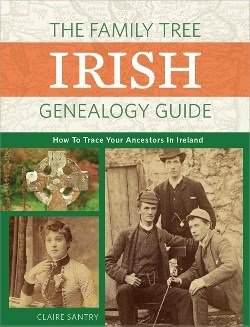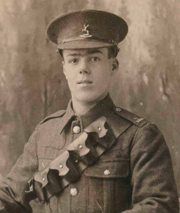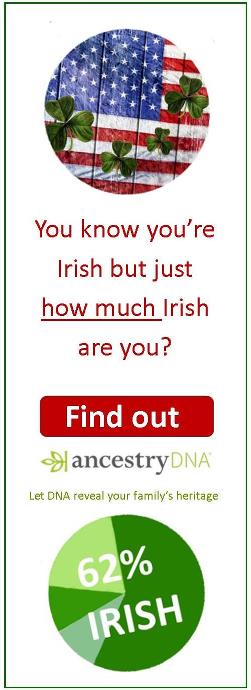- Home ›
- Northern Ireland Genealogy
Best sites for Northern Ireland genealogy research
Choosing the best sites for genealogy research in Northern Ireland is tricky because so many websites relevant to research in the Republic of Ireland are equally relevant north of the border.
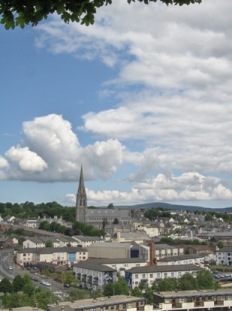 Great view from the medieval walls of Derry-Londonderry
Great view from the medieval walls of Derry-LondonderryFor clarity's sake, therefore, I chose a handful of databases that specifically target Northern Ireland genealogy research and would suggest that anyone tracing Irish ancestry in the six counties also takes a look at my other lists of (both free and pay-to-view) online resources.
There are links to those lists at the bottom of the page, under the heading Related Pages.
Each of the websites or databases below has earned its place in this short list by offering free access to a good proportion, if not all, of their information.
The sites are in alphabetical order.
Eddie's
Extracts
All manner of records can be found within Eddie's Extracts. As its name suggests, it's a collection of records that Eddie (Connolly) has extracted from a number of sources, principally newspapers.
These include notices of births, marriages and deaths; rolls of honour (war dead), court reports, inquests and books. It's particularly strong on Presbyterian records, but really, anyone carrying out genealogy in Northern Ireland ought to take a good look at Eddie's collection. And it's all free, too.
GRONI
The General Register Office of Northern Ireland (GRONI) has an online database of civil registrations of births (from 1864), marriages (from 1845/1864) and deaths (from 1864) for the six counties of Northern Ireland.
While this is free-to-search and many researchers will find some of the details returned by the free search to be useful, most people will need to access additional information or view a copy of the register; these requests attract a fee for which they must pay by credit/debit card. Fortunately, the fee structure is quite bearable.
Records available to view from the online database are restricted by data protection law to only those births up to 75 years ago, marriages up to 50 years ago, and deaths up to 50 years ago.
Researchers working on the GRONI computers at the Public Record Office of Northern Ireland (or those at the GRONI's office itself) can view records registered up to a week or two ago, ie the data protection restrictions do not apply.
Please be aware that the IrishGenealogy.ie database managed by the Republic of Ireland's government also offers birth, marriage and death registrations from the counties of Antrim, Armagh, Down, Fermanagh, LondonDerry and Tyrone up to the end of 1921. They are exactly the same records as those in the GRONI database. Via IrishGenealogy.ie you can view and download digitised images of the register pages for each entry.
These records are free to access.
(See also Irish Genealogy Toolkit's Northern Ireland civil registration records page.)
PRONI
Established in 1923 following the partition of the island into the Republic of Ireland and Northern Ireland, the Public Record Office of Northern Ireland (PRONI) is the official repository for public records for the six counties of Antrim, Armagh, LondonDerry, Down, Fermanagh and Tyrone.
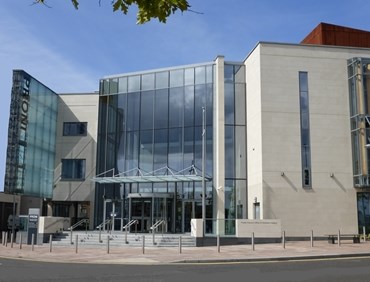 The Public Record Office of Northern Ireland (PRONI), Belfast
The Public Record Office of Northern Ireland (PRONI), BelfastThis free site offers databases containing details
of those who signed the Ulster Covenant (1912), records of pre-1840
Freeholders, street directories 1819-1900, Will calenders 1858-1965, and more than 93,000 transcribed wills.
It also provides free online
access to the Revision/Cancelled Books which continued the work of Griffith's
Valuation from the mid 19th century to the 1930s, and an excellent historical maps viewer.
See PRONI's menu of free databases.
You can also download several very useful guidance leaflets specific to Northern Ireland genealogy and local history research, such as the Church Records leaflet (3) which provides an overview of the microfilms or paper records available at PRONI for each denomination and for which years.
Also at PRONI, but only for personal visitors, are computer terminals that link to the full GRONI database. The latter allows (pay to view) access to both the historical and current birth, marriage and death civil records.
Ulster Ancestry
While the business of much of the Ulster Ancestry site is to target potential
paying customers, it also has a large and very useful selection of free
databases. These include muster rolls (dating back to 1631), local directories,
gravestone inscriptions, clergy lists, some marriage records and a significant
number of ship passenger lists.You'll find them organised by county under the 'Free Pages' button in the menu bar.
Fascinating stuff. And the site owner is to be applauded for placing it online for free access.
Ulster Directory
Although the ebook of the Belfast and Ulster Directory
for 1852 has to be purchased, the more recent edition,
published in 1910, can be searched freely from this page.
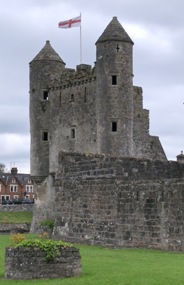 Enniskillen Castle, Fermanagh
Enniskillen Castle, FermanaghA list of 160 towns is linked to individual pages giving brief details of the town (market day, number of inhabitants), information about post office officials and local places of worship (and their clergy), plus a list of adult inhabitants, their occupations and, in some instances, their address.
This directory is unlike most others published before it, which tended to list only gentry, local officials and tradespeople.
Although much of the information about individuals is now freely available on the 1911 census, the different format (plus additional information about the 'social structure' of each community) means this database remains a useful addition to Northern Ireland's genealogy resources.
If you root around the site, you'll find it also has some pedigrees and a good range of 1862 Directories for Ulster and the Republic. And it's all free to access.
Ulster
Historical Foundation
The Ulster Historical Foundation is one of the major genealogical research agencies, family history records suppliers and education providers operating in Northern Ireland. The company is based in Newtownards, about 10 miles east of Belfast.
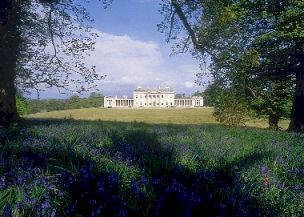 Castle Coole is a magnificent neo-classical house located near Enniskillen, Co. Fermanagh.
Castle Coole is a magnificent neo-classical house located near Enniskillen, Co. Fermanagh.The organisation specialises in undertaking Irish and Scots-Irish research and runs both study programmes and a membership association called the Ulster Historical and Genealogical Guild.
The Records section of AncestryIreland offers a good number of items of genealogical interest. Among these are detailed civil parish maps and lists of townlands per county, a small selection of ebooks, and a searchable database containing birth, marriage and death records, plus gravestone inscriptions, street directories and much more.
There are also a handful of free to search and view collections.
The Ulster Historical Foundation also publishes and distributes many books of interest to Irish genealogists and historians. While many relate only to Northern Ireland, some cover the island.
Related pages
Don't limit your family history research to sites that are dedicated purely to
Northern Ireland. Genealogy records for Counties Antrim, Armagh,
Derry-Londonderry, Down, Fermanagh and Tyrone are also held in the Republic.
- See an overview map of Northern Ireland from 1848.
Related pages
Don't limit your family history research to sites that are dedicated purely to
Northern Ireland. Genealogy records for counties Antrim, Armagh,
Derry-Londonderry, Down, Fermanagh and Tyrone are also held in the Republic.
See:
My selection of the top 10 free genealogy websites for all-Ireland
A list of the best Irish genealogy databases that charge for access
An overview map of Northern Ireland dating from 1848.
Did your ancestors work in the
Irish Linen industry?

If your research in Northern Ireland's genealogy collections has revealed ancestors who worked in the cloth industry, you'll be interested to know how Irish linen was made and how the trade developed into such a major employer.
Find out how the flax plant is transformed into this world-famous lustrous cloth and how the linen trade became such an important part of the landscape, especially in Ulster.
